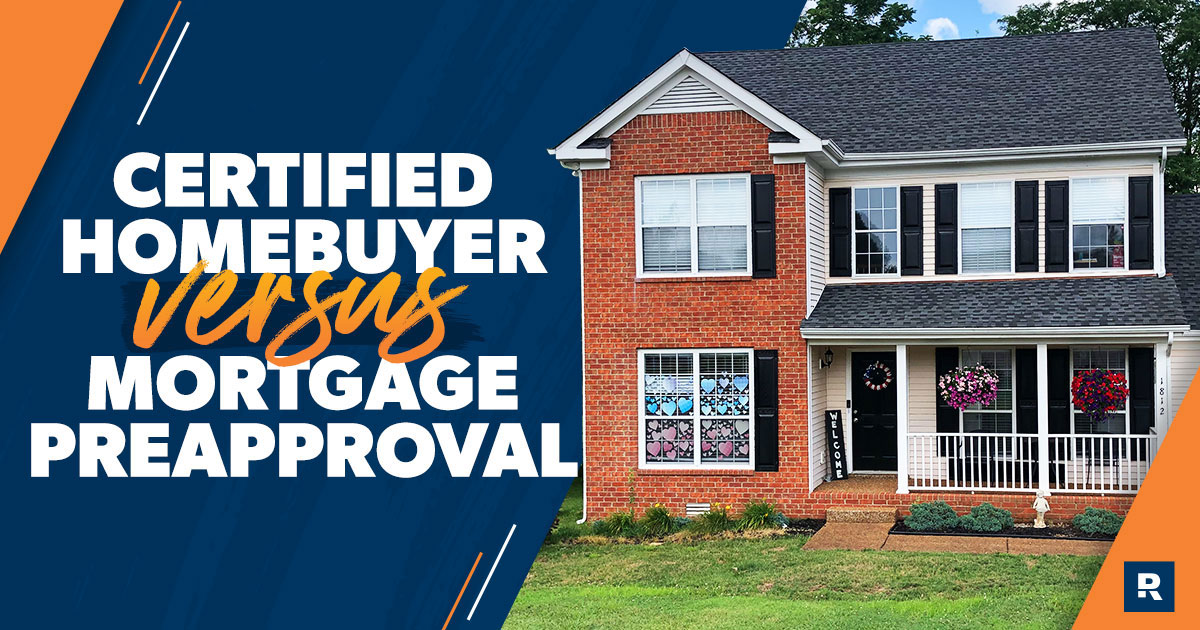Which Is Better: Certified Homebuyer or Mortgage Pre-Approval?
6 Min Read | Feb 26, 2025

In a white-hot housing market, how do you stand out from other buyers without a cash offer?
Believe it or not, there is a way to position yourself like a cash buyer for that dream home you’re after. And at a time when a lot of real estate agents won’t even return your phone call if you can’t show you’re ready to sign on the dotted line, this cash-like advantage gives you the competitive edge you need.
So, what’s the secret? Becoming a certified homebuyer!
As a certified homebuyer, you can shop for your new home with confidence and get your offers accepted faster than other buyers. This approach is different from getting the standard pre-approval from a home loan officer—which just doesn’t have the same buying power anymore. Instead, certified homebuyers take it to the next level and get to the closing table sooner.
We know the home loan process can be overwhelming and all this mortgage lingo can be confusing. Don’t worry! Here’s what you need to know about getting a loan for the home of your dreams:
Why Mortgage Pre-Qualification Isn’t Enough
Any home loan officer can say you’re “pre-qualified.” A mortgage pre-qualification is based on information you provide, but it’s not a full verification of your income and assets. Sure, you’ve told the loan officer how much you make and how much of a down payment you’ve saved. And they probably ran a preliminary formula that shows them how much house they think you can afford.
While it may seem like the quickest and easiest option, you’re not actually approved for financing at this point. And if you’ve invested weeks or months of your time into finding the perfect home, waiting to get your loan approved means your dream house could get sold right out from under you.
Why Mortgage Pre-Approval Isn’t Enough
A standard mortgage pre-approval gets you a bit further in the process than a pre-qualification because you’re actually submitting documentation to the lender to determine how much house you can afford.
But that still doesn’t mean a mortgage underwriter has reviewed your file—which is a big problem. Because your pre-approval is less reliable without a mortgage underwriter’s review. When you take a little more time to become a certified homebuyer, that means a mortgage underwriter actually reviews the financial documents you submit to your lender. And that extra step can make the race-winning difference.
So, you already know you’re investing a lot of time and effort into the home-buying process. And when you’re getting ready to buy a home, time is money. Think about being up against other homebuyers as running a marathon. You’ve put in all the training leading up to race day and you have high hopes to win, but when you finally cross that finish line neck-and-neck with the runner next to you, the race official bypasses you and gives the medal to the other runner—because in the end, they leaned a little farther over the line.
The home-buying process can be just as competitive. Homebuyers with only a mortgage pre-approval often come up short when competing neck-and-neck with certified homebuyers.
Your Guide to Finding an Affordable Home You Love
Learn our simple, step-by-step process to make closing on the right home for you easier and less stressful.
How to Become a Certified Homebuyer
To become a certified homebuyer, you need to provide the same documentation as you would for a mortgage pre-approval:
- Proof of Income
This is hard evidence that you’re making every dollar you claim. You’ll need to round up pay stubs, W2s for the past two years, and other documentation the lender might ask for to prove the money you claim to make. - Proof of Assets
Did you list a bank balance of $50,000 on your mortgage application? Then be prepared to hand over a recent bank statement so the mortgage lender is sure you’ll be able to pay the down payment, title fees, and closing costs. - Proof of Employment
Mortgage lenders aren’t going to rely on your word that you work where you say you do. They’ll ask for pay stubs dating back several months and the contact information for your Human Resources department to confirm you still work there. - Proof of Identity
Are you who you say you are? You’ll need to confirm your identity with a driver’s license, Social Security card, and other forms of identification like a passport or military ID. And if you’re married, don’t forget your spouse’s proof of identification! - Proof of Your Credit Score
Now, let’s get something straight. Even though the majority of the banking industry would say you need a credit score, if you’re working Dave’s Baby Steps, you know that’s simply not true. Following the Baby Steps means you’ve kicked debt to the curb and probably don’t have a “normal” credit score. All credit scores measure are various debt indicators—so it’s really more of an “I-love-debt” score.
But believe it or not, there are lenders like Churchill Mortgage who don’t require that you have a credit debt score, and can manually underwrite your loan! Other lenders will pull your credit reports, compile a credit score, and include your score and report in the mortgage application.
Get the right mortgage from a trusted lender.
Whether you’re buying or refinancing, you can trust Churchill Mortgage to help you choose the best mortgage with a locked-in rate.
Underwriting: The Extra Step
With all of your financial documents submitted to your lender, here’s where you can set yourself apart from other homebuyers. Take the extra step and have an actual underwriter review your file. Doing this on the front end gets you conditionally approved for financing on a new home, subject to the approval of your desired property.
Dave Ramsey recommends one mortgage company. This one!
Here are a few reasons becoming a certified homebuyer is so important in today’s market:
- Both you and the home seller can have peace of mind that your funds will be approved when it’s time to sign on the dotted line.
- Going through this process up front helps catch any hiccups early on and prevents issues from popping up at the last minute.
- You increase your odds of having your offer selected in housing markets where there are often multiple offers on one home.
Remember, underwriters have the final say in the mortgage approval process. Having their stamp of approval can be a huge benefit when you’re ready to buy your dream home. It’s essentially like making a cash offer!
Final Steps
From here, the only steps left in the home-buying process are the appraisal and title research—the same steps cash buyers have to complete. In other words, you can close on your loan in as little as two weeks just like a cash buyer!
Getting a mortgage pre-qualification or pre-approval is just not enough these days. Don’t risk losing your dream house to a more prepared buyer. Work with a top-notch real estate agent who can guide you, and become a certified homebuyer with the expert help of Churchill Mortgage. With just a little more time and effort, you can edge out the competition.
And Dave would probably tell you that doing this extra little bit now will be well worth it when you’re sipping sweet tea on the back porch of your dream home later.
Take your home-buying credentials to the next level today and get in touch with a Churchill Mortgage expert! They’ll walk you through each step of the way to becoming a certified homebuyer.
Did you find this article helpful? Share it!

We Hear You!
We’re considering adding the ability to save articles to your Ramsey account.




